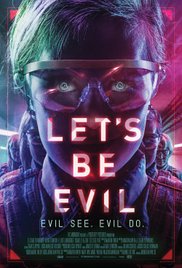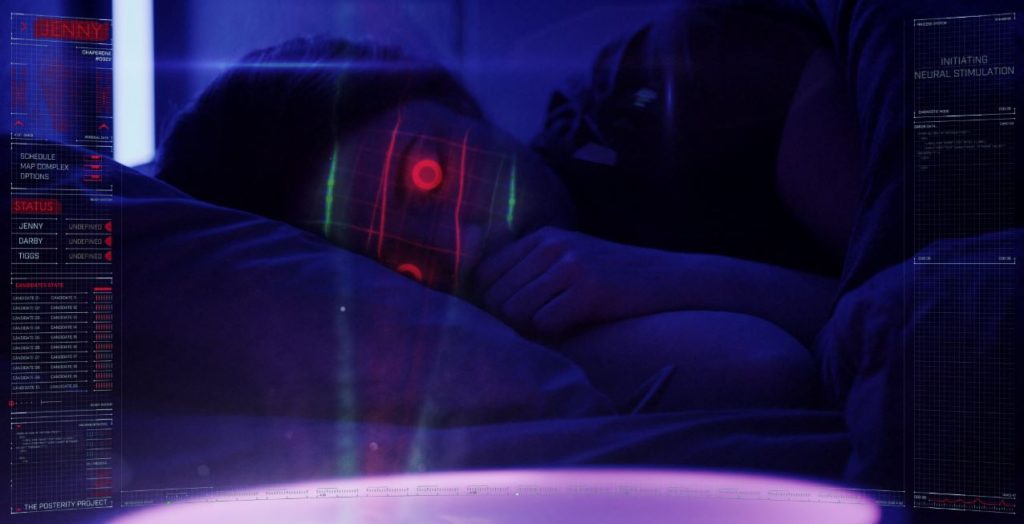I have a soft spot in my heart for school horror films. Maybe it's my proximity to education (working in educational theater for over a decade now, subbing in schools, getting my certification in order) but the subgenre offers a very twisted, socially conscious nightmare consistently.
 Let's Be Evil is no exception. Essentially, a new pilot program for the future of education in the United States is set up in a secret facility. Children deemed to have extraordinary mental capabilities live and learn with augmented reality glasses and the guidance of Ariel. Ariel is an artificial intelligence program loaded with the schedule and course material for the students that grows and expands based on the studies of the students. Three adult chaperones are hired to ensure the safety and security of the small class of students, but something starts to go wrong when the children begin interacting with outsiders.
Let's Be Evil is no exception. Essentially, a new pilot program for the future of education in the United States is set up in a secret facility. Children deemed to have extraordinary mental capabilities live and learn with augmented reality glasses and the guidance of Ariel. Ariel is an artificial intelligence program loaded with the schedule and course material for the students that grows and expands based on the studies of the students. Three adult chaperones are hired to ensure the safety and security of the small class of students, but something starts to go wrong when the children begin interacting with outsiders.
The screenplay covers a lot of ground in an efficient way. We're dealing with a narrative tackling many sides of the education debate at the same time. Should students have more of a say in what they study? Are long hours of school with demands for constant advancement through evaluation efficient? How much of schooling should be dedicated to teaching our children to be productive members of society in addition to learning curricula?
Writer/star Elizabeth Morris, writer/director Martin Owen, and writer Jonathan Willis tackle all of this with their first person augmented reality school horror. Once the chaperones enter the facility, the narrative is told entirely from the perspective of the AR glasses. The feed jumps between the three chaperones, providing them information on the facility, the students, and each other as they navigate a foreign world.
The facility in Let's Be Evil is kept in total darkness. All light is artificially produced through the AR goggles. They are the only way to function in the facility. The metaphor of these children literally being kept in their darkness for the sake of a better education is a major element of the plot without being addressed. We're seeing the story of three adults trying to navigate a world mastered by children who haven't seen light for years. The children will have the advantage intellectually and physically, but not socially.
So much of Let's Be Evil is so well done that it's easy to forgive the creative team for missing a bit on the ending. Part of what makes this horror/sci-fi/satire so great is the assumption that the audience is smart enough to understand the film. You are always given just enough information to follow along; the rest is open for interpretation. The final twist, though, creates a bit of a paradox that severely limits individual interpretation.
Still, after the recent arthouse trend of exploitation and sexualization of artificial reality characters (Ex Machina and Her being the most widely-seen examples) because they're not really women (so straight up ogling is technically okay (I wish there was a more mature way to state I'm rolling my eyes right now, but there you have it)), it's quite refreshing to see AI and new technology treated as what it actually is: a tool. Ariel and the AR glasses have a certain personality to them and are obviously interactive, but everyone in the film treats them as convenience, not slave. The emotion question is handled beautifully, and Ariel itself refuses to humanize herself without acknowledging these quirks were programmed in.
Ultimately, the suspense and terror of Let's Be Evil comes from the reaction to new technology in an educational setting rather than humanizing and then demonizing computer programming. There is no scapegoat beyond human ambition and failings in this film. The core of this story has been told in many variations before in settings all around the world; never has it felt more immediate, honest, and believable as it is covered in Let's Be Evil. I'll take a great film with a slightly off ending over a manipulative excuse to alienize desirable or malicious traits on computers and children because that's safer.
Let's Be Evil is currently streaming on Netflix.

